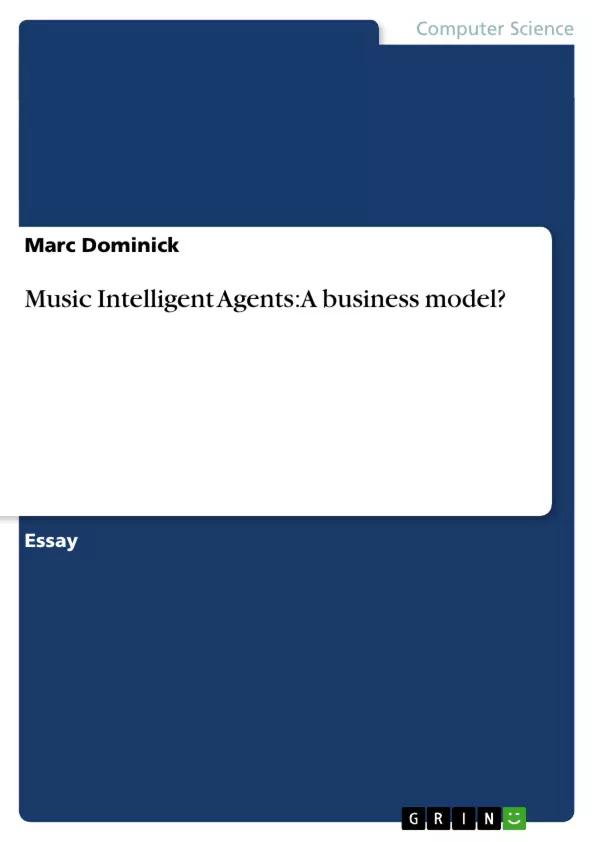The rise of the Internet brought disintermediation effects to a huge number of industries of which the music industry is maybe the most prominent example. How technology changed the rules of this world-wide multi-billion dollar business became particularly evident mostly because of the important legal aspects involved. Record companies had to put up with huge losses, and now on a sudden four years are gone since Napster sparked the P2P revolution in 1999.1The increasing digitization of music and concomitant changes in music production and distribution are not reversible anymore. Astonishingly, record companies have not yet come up with models or strategies that use the advantages of this process successfully. Any attempt failed so far because they could not convince the most important stakeholder - the consumer.2This paper concentrates on intelligent agent technology which has been promisingly described as “[..] software that is proactive, personalized, and adapted. Software that can actually act on behalf of people, take in itiative, make suggestions [..]”3. With more than 4 million existing music titles4music listeners have increasingly problems to discover and select artists or songs they really like. Consequently, they tend to take (mostly in MP3 format) what they can get, be it legal or not, and hope to find a ‘jewel’ among the songs. Intelligent agents in the form of recommender systems pick up the idea of personalization which lacks application in the area of music compared to other indu stries and might help to mitigate the dilemma of the music industry. Therefore the objective of this paper is to develop a business model based on intelligent agent architecture to automatically provide and recommend music that meets the individual consumer’s taste addressing both business and technical aspects.
Inhaltsverzeichnis (Table of Contents)
- Introduction
- Basic problem and objective
- Methodology and outline
- Basic concepts and definitions
- Intelligent agents
- Recommender systems and information filtering
- A Business Model for Music Intelligent Agents
- Value proposition
- Inconsistencies in the music market.
- Overview of the solution and benefit.
- Architecture of value creation
- Creating user models.
- Recommendation interface and learning from user feedback
- Filtering and recommendation technique.
- Software implementation.
- Revenue sources
- Content provider
- Consumer
- Market research data and targeted marketing
- Further implications of the model
- Technical limitations and challenges
- Security and social issues
- Conclusion.
Zielsetzung und Themenschwerpunkte (Objectives and Key Themes)
This paper aims to develop a business model for a music recommender system based on intelligent agent technology. The model addresses both business and technical aspects, focusing on providing and recommending music tailored to individual consumer preferences.
- The impact of the Internet on the music industry and the challenges faced by record companies.
- The potential of intelligent agents, specifically recommender systems, to address the issue of information overload in music consumption.
- The development of a business model for a music recommender system using intelligent agent technology.
- The architecture of the system, including user modeling, recommendation techniques, and software implementation.
- Potential revenue sources and business implications of the model.
Zusammenfassung der Kapitel (Chapter Summaries)
The paper begins with an introduction to the problem of information overload in the music industry and the potential of intelligent agents to address this issue. Chapter two provides a theoretical foundation by discussing the concepts of intelligent agents, recommender systems, and information filtering. It introduces the concept of intelligent agents as software programs that autonomously execute tasks on behalf of a user and describes recommender systems as an application field of intelligent agents that aim to address information overload.
Chapter three focuses on the development of a business model for a music recommender system based on intelligent agent technology. It outlines the value proposition of the model, which addresses inconsistencies in the music market and provides benefits to both consumers and content providers. This chapter also explores the architecture of the system, including user modeling, recommendation interface, filtering techniques, and software implementation.
Chapter four explores further implications of the model, including technical limitations, challenges, security concerns, and social issues.
Schlüsselwörter (Keywords)
The paper focuses on the intersection of intelligent agents, recommender systems, and the music industry. Key terms include music intelligent agents, information filtering, recommender systems, business models, value proposition, user modeling, and revenue sources.
Frequently Asked Questions
What are Music Intelligent Agents?
They are proactive, personalized software programs that act on behalf of users to discover and recommend music based on individual tastes.
How does a recommender system solve information overload?
With over 4 million music titles available, these systems use information filtering to help users find high-quality content that matches their preferences.
What are the potential revenue sources for this business model?
Revenue can come from content providers, consumer subscriptions, and the sale of market research data for targeted marketing.
What is the "Value Proposition" of music agents?
The value lies in personalization, saving the user time in music discovery and providing content providers with better distribution channels.
What are the technical challenges for music agents?
Challenges include creating accurate user models, implementing effective filtering techniques, and addressing security and social issues.
- Quote paper
- Marc Dominick (Author), 2003, Music Intelligent Agents: A business model?, Munich, GRIN Verlag, https://www.grin.com/document/44796



